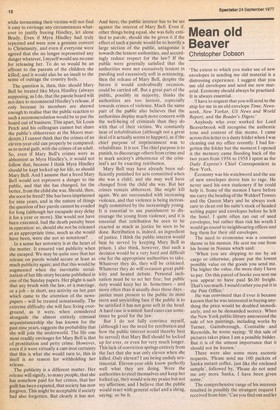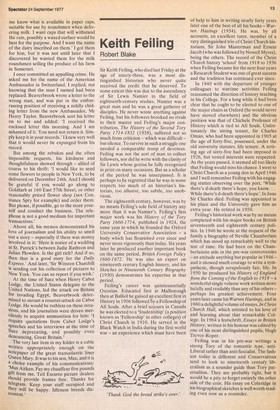Mean old Beaver
Christopher Dobson
'The extent to which you Make use of new envelopes in sending me old material is a distressing experience. I suggest that you use old envelopes and send me new material. Economy should always be practised. It is always essential.
'I have to request that you will send to the ship for me in an old envelope Time, Newsweek, New Yorker, US News and World Report, and the Reader's Digest.'
Anybody who ever worked for Lord Beaverbrook will recognise the authentic tone and content of this memo. I came across this letter in a dusty folder when I was cleaning out my office recently. I had forgotten the folder but the moment I opened it the memory came flooding back of the two years from 1956 to 1958 I spent as the Daily Express's Chief Correspondent in New York.
Economy was his watchword and the use of new envelopes drove him to rage. He never used his own stationery if he could help it. Some of the memos I have before me carry the heading of the Waldorf Towers and the Queen Mary and he always took care to clean out his suite's stock of headed writing paper and envelopes before he left the hotel. I quite often ran out of used envelopes, but rather than risk his wrath I would go round to neighbouring offices and beg them for their old envelopes.
The need to economise was a constant theme in his memos. He sent me one from his house in Nassau which said: 'When you are shipping to me by air cargo or otherwise, please put the lowest possible value on the goods you send me. The higher the value, the more duty I have to pay. On this parcel of books you sent me you appear to have paid $6.00 freight. That's too much. I would rather you put it in the Post Office.'
He was convinced that if ever it became known that he was interested in buying anything the price would be doubled immediately, and so he demanded secrecy. When the New York public library announced the sale of ten paintings, including works by Turner, Gainsborough, Constable and Reynolds, he wrote saying: 'If this sale of pictures takes place I am a possible bidder. But it is of the utmost importance that it should not be known.'
There were also some more esoteric requests, 'Please send me 100 packets of Sanka instant coffee, just like the enclosed sample', followed by, 'Please do not send me any more Sanka, I have been given some.'
The comprehensive range of his interests resulted in possibly the strangest request I received from him: 'Can you find out and let me know what is available in paper caps, suitable for use by roundsmen when delivering milk. I want caps that will withstand the rain, possibly a waxed surface would be best for the purpose. And I want the name of the dairy inscribed on them.' I got them for him, but it was not until later that I discovered he wanted them for the milk roundsmen selling the produce of his farm in Somerset.
I once committed an appalling crime. He asked me for the name of the American Ambassador in Switzerland. I replied, not knowing that the man I named had been replaced. Beaverbrook wrote a letter to the wrong man, and was put in the embarrassing position of receiving a mildly chiding letter from the new Ambassador, Mr Henry Taylor. Beaverbrook sent his letter on to me and added: 'I received the enclosed letter this morning. And I am ashamed of it. You need not return it. Simply keep it in your records.' I knew very well that it would never be expunged from his record.
But among the rebukes and the often impossible requests, his kindness and thoughtfulness showed through — allied of course to his thrift: 'I would like to send some flowers to people in New York, to be delivered on December 24th. And I should be grateful if you, would go along to Goldfarb at 160 East 57th Street, or other reasonably priced flower shop (not Constance Spry for example) and order them. But please, if possible, go to the store yourself and conduct the business. The telephone is not a good medium for important transactions.'
Above all, his memos demonstrated his love of journalism and his ability to smell out a story — especially if there was money involved in it: 'Here is notice of a wedding at St. Patrick's between Judie Rathvon and Julian Plowden. Is the girl rich? And if so, then that is a good story for the Daily Express,' And later, 'Sir Winston Churchill IS sending out his collection of pictures to New York. You can so report if you wish.'
At the time of Suez when Henry Cabot Lodge, the United States delegate to the United Nations, led the attack on Britain for invading Egypt, Beaverbrook determined to mount a counter-attack on Cabot Lodge. He would be ruthless on these occasions, and his journalists were driven mercilessly to acquire ammunition for him: '1 require quotations from Cabot Lodge's Speeches and his interviews at the time of Suez deprecating, and possibly even denouncing, Great Britain.' The very last item in my folder is a cable written appropriately enough on the notepaper of the great transatlantic liner Queen Mary. It was to his son, Max, and it is choice example of his communications: Max Aitken. Pay my chauffeur five pounds gift from me. Tell Escarro picture dealers Should provide frames free.. Thanks for telegram. Keep your staff occupied and they will be happy. Idleness breeds discontent.'



































 Previous page
Previous page